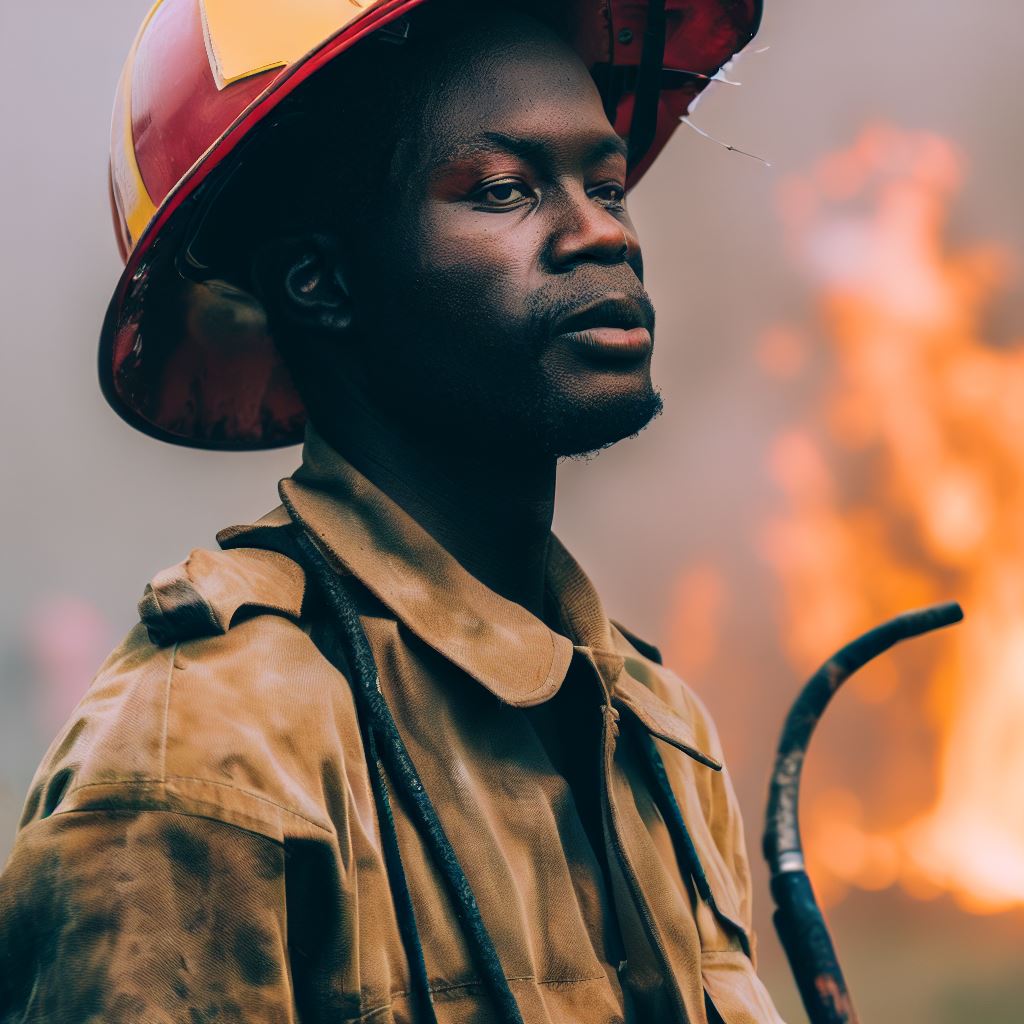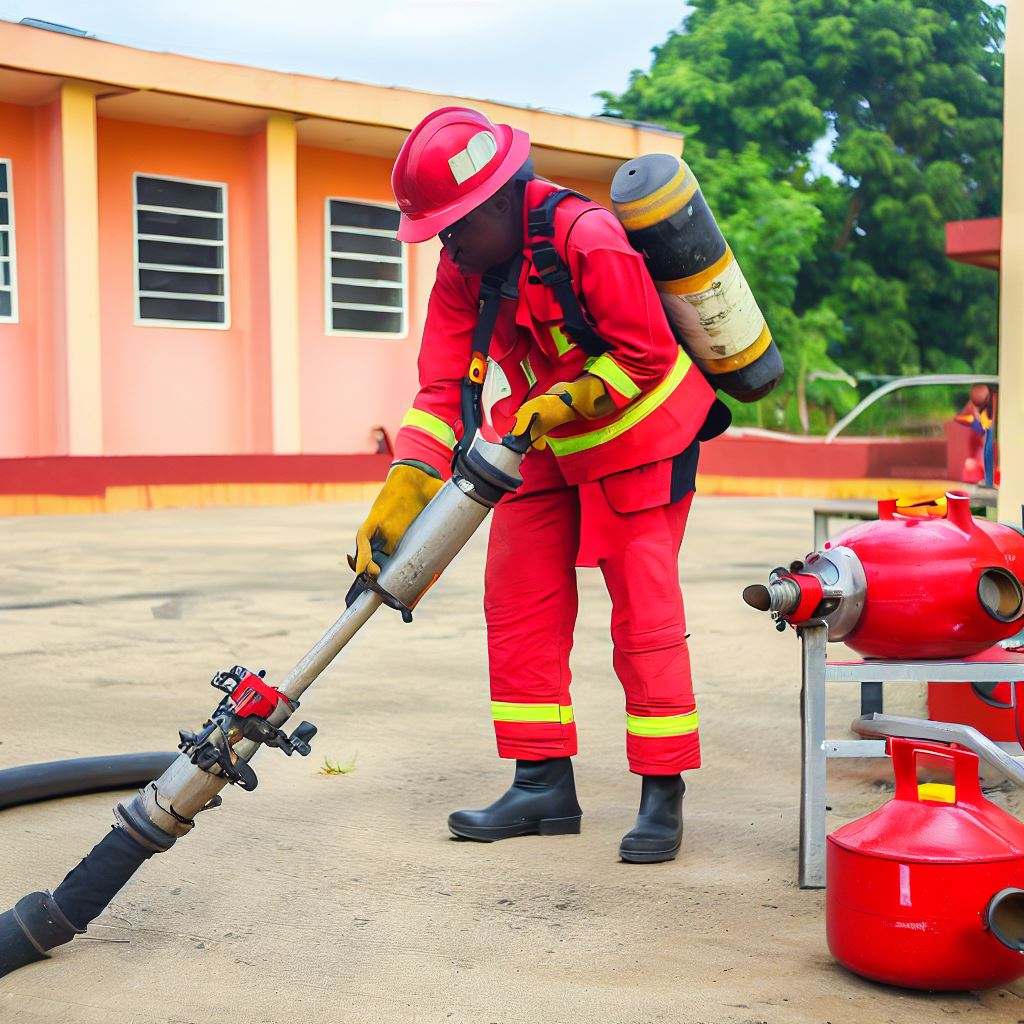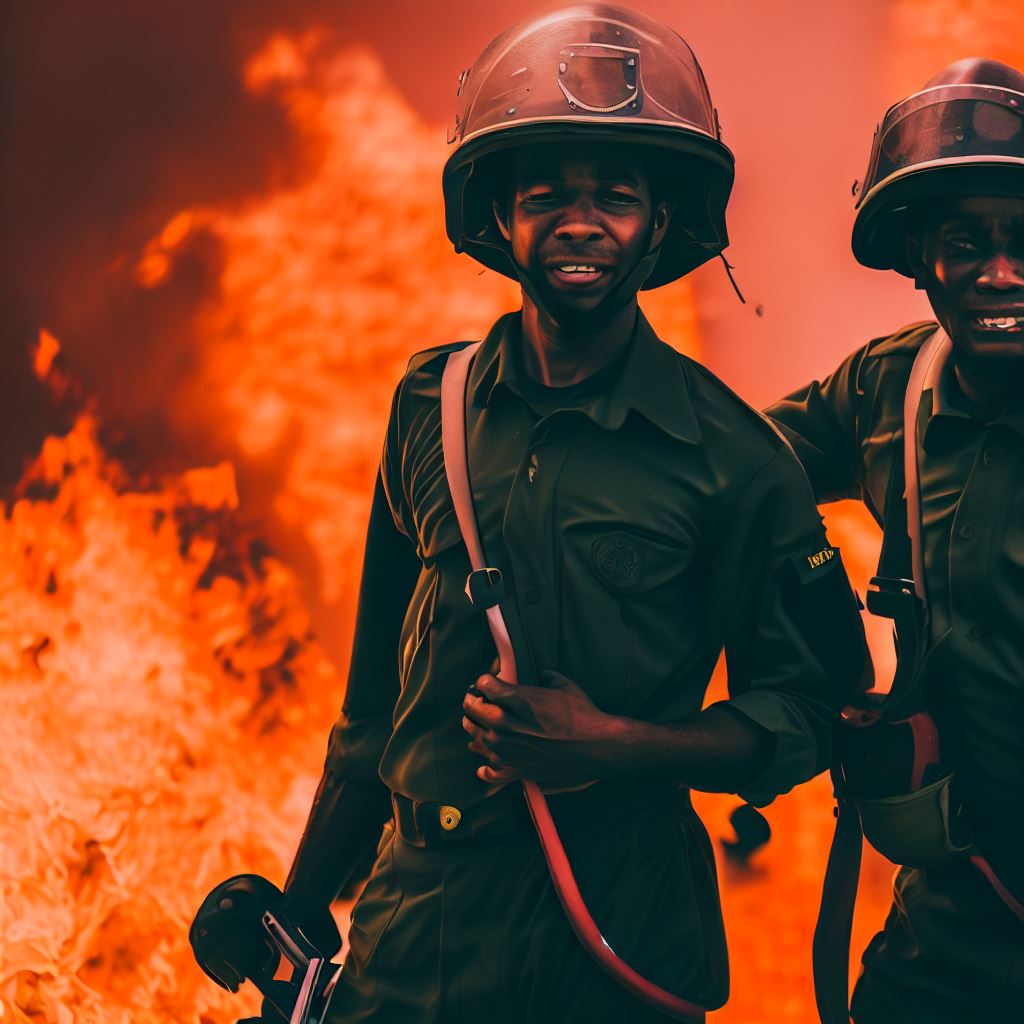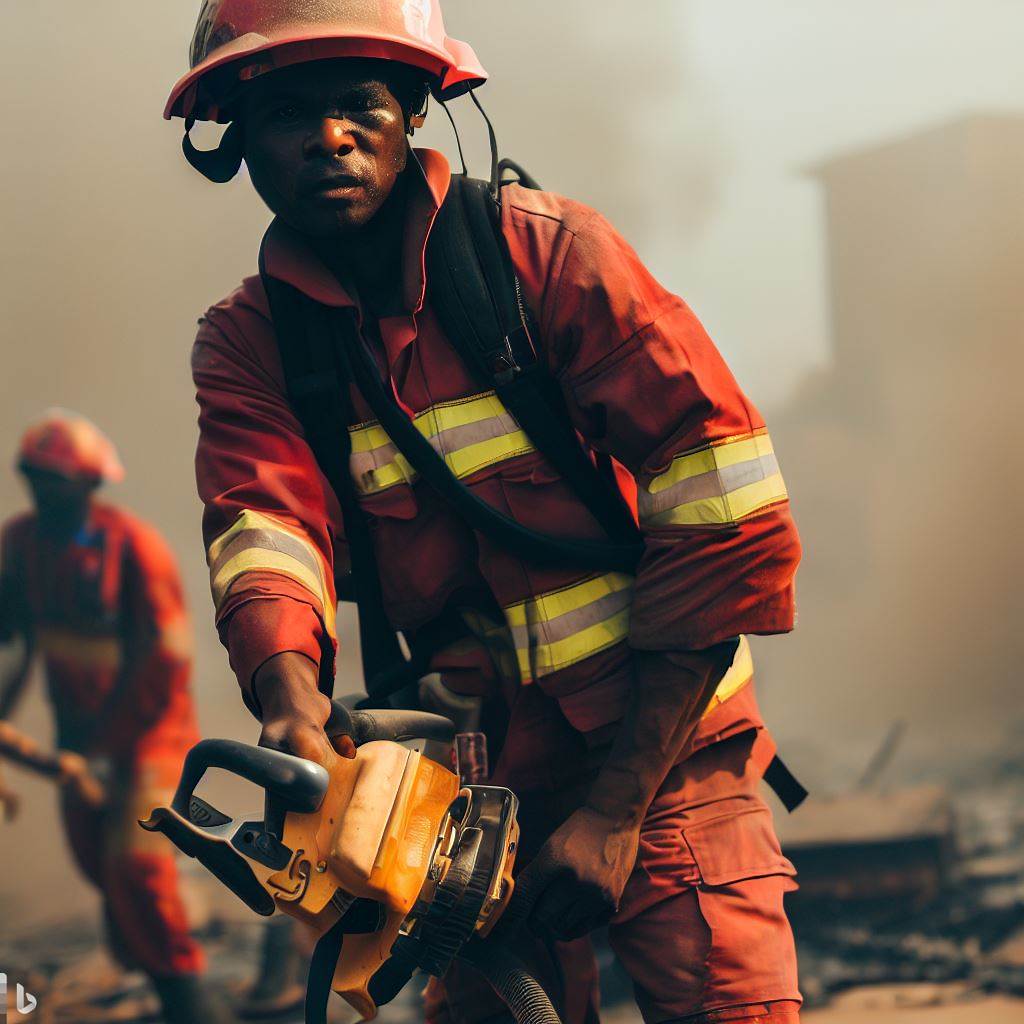Introduction
Firefighting is a crucial aspect of society, as it safeguards lives, property, and the environment.
In Nigeria, the history of firefighting dates back to colonial times when the British introduced firefighting measures.
During this period, firefighting was mainly conducted by the British colonial authorities. They established fire brigades in major cities like Lagos, Port Harcourt, and Kano.
These brigades were equipped with basic firefighting tools like fire engines, hoses, and buckets.
After Nigeria gained independence in 1960, the responsibility of firefighting gradually shifted to the local authorities.
The Fire Services Act of 1963 was enacted, which required each state government to establish its fire service.
Over time, the firefighting services in Nigeria have evolved and improved.
Fire stations were established in different parts of the country, and firefighters were trained to handle various fire incidents effectively.
Modern firefighting equipment and technologies were also introduced to enhance firefighting capabilities.
Despite these advancements, there are still challenges faced by the Nigerian fire service.
Inadequate funding, outdated equipment, and limited training opportunities are some of the issues that hinder the effectiveness of firefighting efforts.
In recent years, however, there has been a growing recognition of the importance of firefighting in Nigeria.
Efforts are being made to address the shortcomings and improve the overall firefighting capacity of the country.
In general, firefighting plays a vital role in Nigeria’s society, and its history reflects the journey of the country towards developing efficient firefighting services.
With continued investments and improvements, Nigeria can better protect its people and property from the devastating impact of fires.
Early Fire Fighting Methods in Nigeria
- Traditional methods used by indigenous communities.
- Utilization of water and natural resources.
- Role of community members in fire prevention and control.
Throughout the annals of history, fire has been an ever-present force, and Nigeria’s past bears testament to this universal truth.
In ancient times, when flames leaped forth, indigenous communities devised ingenious methods to quell the fiery tempest. Their techniques, though rudimentary, served as vanguards of life and property.
Foremost among these methods was the utilization of water, hauled in pots and pails, hurled with fervor to smother the blaze.
Yet, when fire roared with unbridled ferocity, these humble vessels struggled to contain the inferno’s wrath.
Resourcefulness thrived, as sand and soil joined the battle, ensnaring flames and halting their advance.
Trenches dug to barricade, firebreaks forged in earth, these tactics reined in nature’s fury in open terrains and grassy plains.
Remarkable was the unity of the community, every soul a sentinel in the realm of fire.
Roles etched, swift response choreographed, a communication web spun, linking neighboring kin. In unity, they stemmed fire’s relentless march.
Prevention was their creed. Clearing bushes, taming the wild, controlled burns tamed the elements.
Vigilant watchtowers, eyes on the horizon, guarded against impending doom. Smoke or fire, reported in haste, forestalled catastrophe.
These age-old methods birthed Nigeria’s modern fire fighting, where communal spirit and fire safety endure as sentinels of protection in our land.
Influence of Colonial Rule on Fire Fighting
During the colonial era in Nigeria, the fire fighting system underwent significant changes due to the influence of the colonial powers.
Modern firefighting techniques were introduced, fire departments were established in major cities, and firefighters received proper training and equipment.
Introduction of modern firefighting techniques by colonial powers
One of the major impacts of colonial rule on fire fighting in Nigeria was the introduction of modern firefighting techniques.
The colonial powers, recognizing the need for effective fire prevention and control, brought in advanced methods and technologies.
- The use of motorized fire engines replaced traditional methods such as buckets, ropes, and water pumps.
- Improved fire hydrant systems were installed in urban areas, allowing quicker access to water in case of emergencies.
- Colonial authorities also promoted the construction of fire-resistant buildings to minimize the spread of fires.
Establishment of fire departments in major cities
Colonial rule also led to the establishment of formal fire departments in major cities across Nigeria.
These departments were responsible for fire prevention, detection, and extinguishing activities.
- Lagos, the then capital of Nigeria, witnessed the creation of the first fire department in 1890 under British administration.
- Similar departments were subsequently established in other key urban centers, such as Ibadan, Kano, and Port Harcourt.
- The fire departments were manned by well-trained firefighters and equipped with the necessary tools and equipment.
Training and equipping of firefighters
Under colonial rule, efforts were made to train and equip firefighters to effectively handle fire emergencies.
- The colonial authorities introduced professional training programs for firefighters, emphasizing techniques, safety measures, and proper equipment usage.
- Firefighters received formal training in fire prevention, fire investigation, and rescue operations.
- They were provided with modern firefighting equipment, including protective clothing, fire extinguishers, and breathing apparatus.
The colonial influence on fire fighting in Nigeria significantly improved the overall effectiveness of fire prevention and control.
The introduction of modern firefighting techniques, establishment of fire departments, and training and equipping of firefighters laid the foundation for the present-day fire service in Nigeria.
Read: Fire Fighting Laws and Regulations in Nigeria Explained

Challenges Faced by Firefighters in Nigeria
The history of firefighting in Nigeria reflects both the resilience of its firefighters and the enduring challenges they face.
Over the years, brave men and women have confronted blazes with determination, often armed with limited resources.
- Lack of Adequate Equipment and Resources: Outdated equipment hampers firefighting efforts, making it challenging to combat fires effectively.
- Limited Training Opportunities: Scarce training facilities hinder skill development, leaving firefighters ill-prepared for emergencies.
- Inadequate Government Support and Funding: Firefighting departments often struggle due to a lack of financial support, impeding essential equipment and personnel acquisition.
- Inefficient Communication Systems: Outdated communication systems hinder coordination during emergencies.
- Inadequate Infrastructure: Poor road maintenance delays response times, worsening the impact of fires.
- Poor Public Awareness and Education: Limited fire safety knowledge among the public increases fire risk.
- Insufficient Staffing Levels: Understaffed departments strain effectiveness.
- Lack of Protective Gear: Inadequate personal protective equipment exposes firefighters to risks.
- Inadequate Water Supply: Obtaining sufficient water supply is a recurring challenge.
- Limited Collaboration Between Agencies: Inefficient coordination between emergency response agencies leads to operational delays.
- Inadequate Fire Prevention Measures: Absence of robust prevention strategies results in more fires.
- Cultural and Societal Factors: Cultural beliefs occasionally hinder firefighting efforts.
Despite these challenges, Nigeria’s firefighters exhibit unwavering dedication and courage.
Efforts to improve the situation include increased government support, better training and equipment, awareness campaigns, and enhanced interagency collaboration.
These steps are crucial for bolstering firefighting services in Nigeria and ensuring the safety of lives and property.
Read: Challenges and Triumphs: Fire Fighting in Nigeria
Modernization and Development of Fire Fighting in Nigeria
In order to enhance fire service delivery in Nigeria, several initiatives have been undertaken to modernize and develop the firefighting sector.
These efforts have aimed to improve the efficiency and effectiveness of firefighting operations throughout the country.
Efforts to Improve Fire Service Delivery
- Implementation of modern firefighting techniques and equipment.
- Training programs for firefighters to enhance their skills and knowledge.
- Establishment of specialized fire stations in strategic locations.
- Development of standardized operating procedures for firefighting operations.
- Collaboration with international firefighting agencies for knowledge exchange and support.
Introduction of Fire Safety Regulations and Codes
- Enactment and enforcement of legislation focused on fire safety and prevention.
- Development and implementation of national fire safety codes and standards.
- Inclusion of fire safety requirements in building construction and design regulations.
- Establishment of fire safety committees to oversee compliance and enforcement.
- Regular inspections and audits of public and private buildings to ensure compliance.
Formation of National Fire Service Agencies
- Establishment of the Federal Fire Service (FFS), responsible for firefighting at the federal level.
- Creation of state fire service agencies to handle firefighting operations at the state level.
- Deployment of well-trained and equipped firefighters across various regions of the country.
- Collaboration between federal and state fire service agencies for coordinated responses to major fire incidents.
- Development of a nationwide emergency hotline for reporting fire incidents and seeking assistance.
These measures have significantly contributed to the modernization and development of fire fighting in Nigeria.
The introduction of modern techniques and equipment has enhanced the effectiveness of firefighting operations, enabling firefighters to respond more efficiently to emergencies.
Training programs have equipped firefighters with the necessary skills and knowledge to handle various types of fire incidents.
The implementation of fire safety regulations and codes has played a crucial role in preventing fire incidents and reducing their impact.
By incorporating fire safety requirements into building regulations, the risk of fire outbreaks in public and private buildings has been significantly mitigated.
Regular inspections and enforcement activities ensure compliance, creating a safer environment for Nigerians.
The establishment of national fire service agencies, such as the Federal Fire Service and state fire service agencies, has improved the coordination and management of firefighting operations.
These agencies work collaboratively to respond to major fire incidents and provide support to each other when needed.
The nationwide emergency hotline has also made it easier for citizens to report fire incidents promptly, enabling faster response times.
In short, the modernization and development of fire fighting in Nigeria have led to significant improvements in fire service delivery.
Efforts to improve firefighting operations, introduce fire safety regulations and codes, and form national fire service agencies have enhanced the overall efficiency and effectiveness of the firefighting sector in Nigeria.
Major Fire Incidents in Nigerian History
Notable fire disasters that impacted Nigeria
Notable fire disasters that impacted Nigeria include the Lagos market fire of 1956. The Lagos market fire was one of the first major fire incidents in Nigeria’s history.
It resulted in the destruction of significant parts of the market and loss of lives. Another devastating fire incident was the Amarco Building fire in Lagos in 1986.
The Amarco Building fire led to the death of several people and extensive property damage.
Moreover, the fire at the Nigerian Telecommunications Limited (NITEL) building in Lagos in 2002 was a significant fire incident.
It paralyzed communication services and disrupted business activities in the area. Another major fire incident occurred in 2010 at the Great Nigeria House in Lagos.
The fire engulfed the building and caused extensive damage to the property.
In Kano, the Kano Market fire in 2013 resulted in a massive loss of goods and structures. The fire at the Kano Market was challenging to extinguish due to the market’s congested nature.
Furthermore, the Balogun Market fire in Lagos in 2019 was a significant fire disaster.
The fire ravaged the market, destroying goods and livelihoods of many traders.
Evaluation of the response and impact on fire fighting efforts
When evaluating the response and impact on fire fighting efforts, these major incidents revealed an urgent need for improvement.
The response to these fire disasters highlighted deficiencies in Nigeria’s fire fighting capabilities.
In many cases, the fire service lacked adequate resources, including trained personnel and functional equipment.
The delayed arrival of fire fighters at the scenes of these incidents magnified the destruction caused by the fires.
Buildings were often not equipped with fire extinguishers, smoke alarms, or emergency exit systems.
The impact on fire fighting efforts was evident in the increased demand for fire safety regulations and enforcement.
These major fire incidents prompted authorities to reevaluate fire prevention and response strategies.
Government agencies started implementing stricter building codes and regulations to enhance fire safety.
Also, fire fighting services received improved funding and training to enhance their capabilities.
Efforts were made to establish better communication systems and coordination between fire service units.
In fact, Nigeria has experienced significant fire incidents throughout its history, with devastating consequences.
These fire disasters have exposed weaknesses in fire fighting efforts, necessitating improvements in resources, training, and regulations.
By learning from these incidents, Nigeria can work towards preventing future fire disasters and reducing their impact.
Read: Nigeria’s Fire Fighting: A Day in the Life of a Hero
Uncover the Details: Solar PV Education Programs in Nigeria’s Schools
Current State of Fire Fighting in Nigeria
- The present fire service capabilities in Nigeria need a thorough analysis to assess their effectiveness.
- Ongoing challenges and gaps in the fire fighting system should be addressed to improve its overall efficiency.
- Public awareness about fire safety and active community involvement are of paramount importance.
The history of fire fighting in Nigeria is a testament to the country’s journey towards enhancing its fire safety measures.
Over the years, Nigeria has faced numerous challenges in this regard, but it has also made significant progress.
In the early days, fire incidents were primarily tackled by local communities, often using rudimentary methods and limited resources.
It wasn’t until the colonial era that formal fire services began to take shape, with the establishment of the Lagos Fire Brigade in 1896.
As Nigeria gained independence, efforts to modernize fire services intensified. Infrastructure and equipment were gradually improved, and training programs were introduced.
However, the rapid urbanization and industrialization of the country brought new challenges.
Today, Nigeria recognizes the need for comprehensive reform.
Addressing infrastructure gaps, investing in modern equipment, and promoting public awareness are key components of a forward-looking strategy.
Collaborative efforts with international partners further enhance the nation’s fire fighting capabilities.
In the face of evolving threats, Nigeria’s commitment to fire safety remains unwavering, ensuring the safety and well-being of its citizens.
Read: Fire Fighter Training: A Guide to Courses in Nigeria
Conclusion
The history of fire fighting in Nigeria has shown significant progress over the years.
From simple bucket brigades to modern firefighting techniques, firefighters have continuously dedicated themselves to protect lives and property.
We must appreciate the relentless efforts of these brave individuals who risk their lives every day to extinguish fires and save lives.
Their commitment and selflessness deserve our utmost respect and gratitude.
However, there is still more work to be done. In order to further improve fire fighting in Nigeria, we must all come together and support these firefighters.
This can be done by advocating for better training, equipping fire stations with modern technologies, and increasing public awareness about fire safety.
Furthermore, it is essential for the government and relevant authorities to invest in fire prevention measures such as regular safety inspections, enforcing building codes, and promoting fire safety education in schools and communities.
In the end, let us all unite in our efforts to make Nigeria a safer place from the threat of fires.
By supporting and improving fire fighting services, we can effectively reduce the impact of fires and protect our communities.
Remember, fire safety is everyone’s responsibility.




